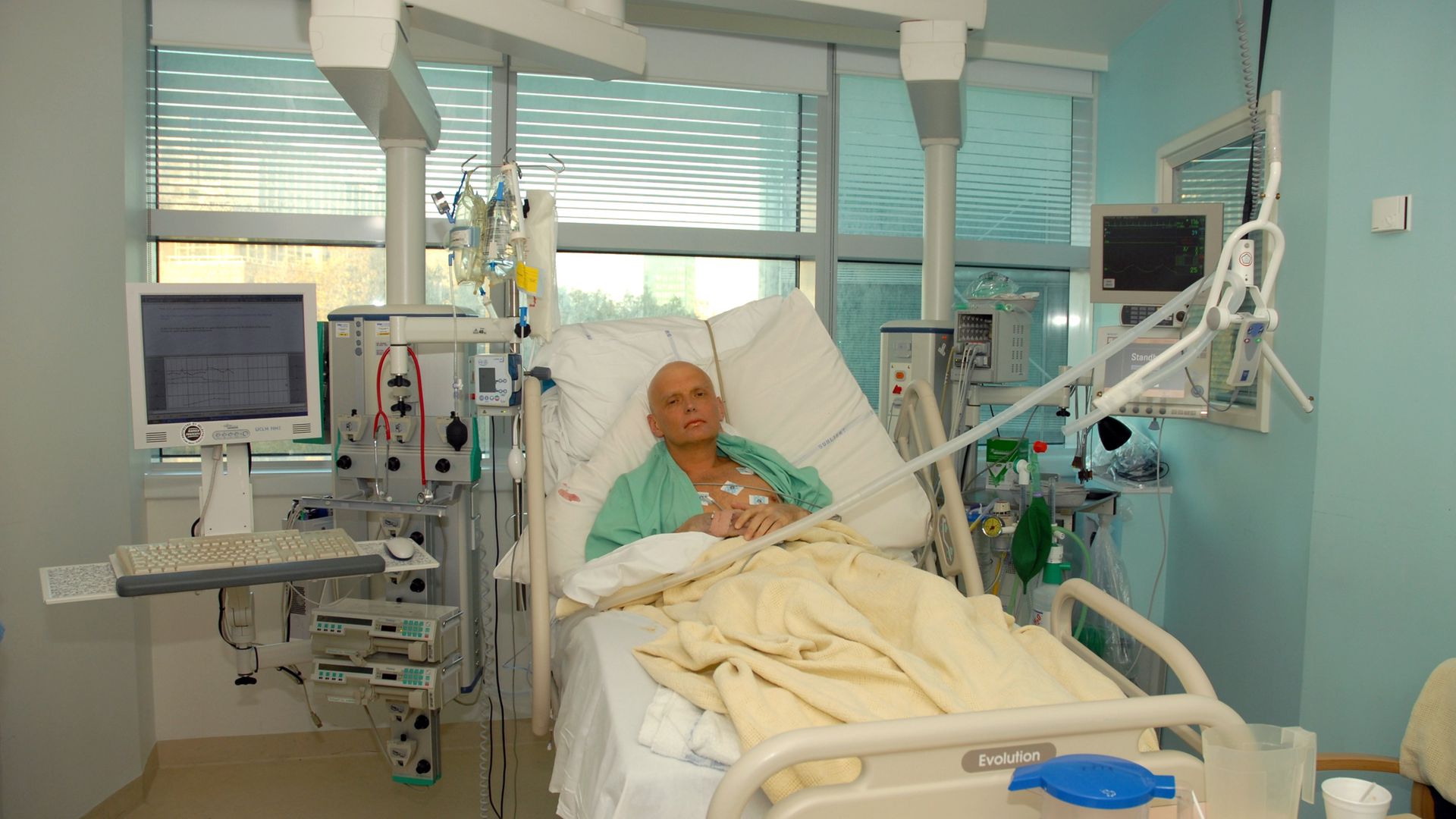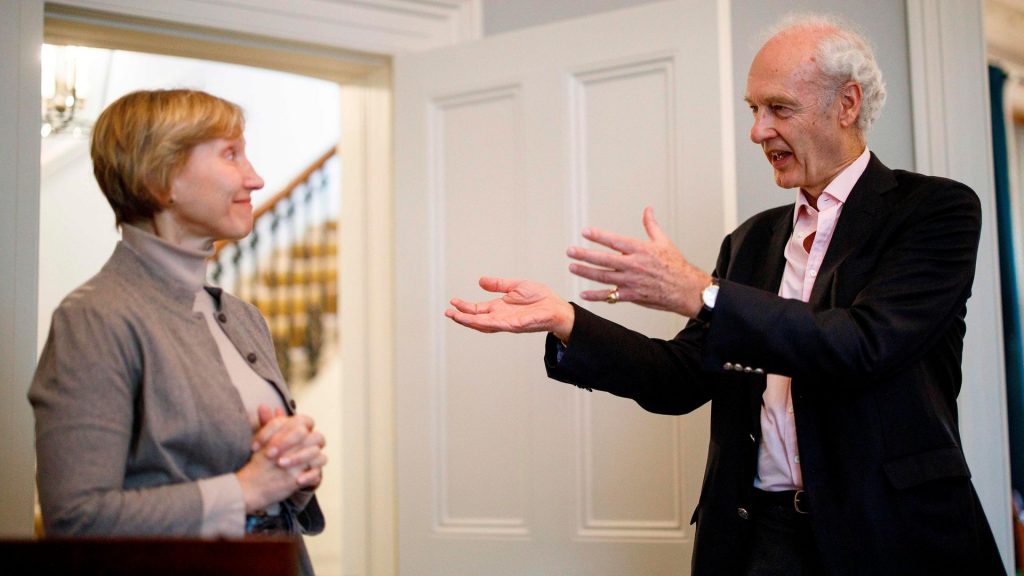
The Russian defector’s fatal poisoning has been turned into an opera, approved by his widow, says KIRSTY LANG
In the 15 years since Alexander Litvinenko was poisoned drinking tea in a central London hotel, there have been numerous books, film documentaries and a stage play inspired by his story. Now for the first time, there is an opera about the former Russian KGB man whose outspoken criticism of president Putin cost him his life. The Life & Death of Alexander Litvinenko has its world premiere later this month at the Grange Park Opera, set on the estate of 14th century country house nestled in the Surrey Hills.
“What happened to Sasha Litvinenko has all the ingredients of a good opera,” says composer Anthony Bolton, “A love story, power politics, betrayal and murder.”
Bolton was inspired by Death of A Dissident, written by Litvinenko’s widow, Marina with Alexander Goldfarb. The love story between the married couple drives the opera. But in the background, geopolitics mixes with Litvinenko’s courageous act of betrayal. In November 1998, he publicly accused his superiors in the Federal Security Service (FSB) of corruption and of ordering the assassination of the Russian oligarch and Putin critic, Boris Berezovsky. Litvinenko was the first to coin the phrase “Mafia state” and, in Putin’s eyes, this made him a traitor.
The opera opens with a projection of the now-iconic image of Litvinenko lying in his hospital bed. His hair has fallen out. His chest is covered with monitors. His gaunt face and eyes that seem scarred by pain gaze defiantly into the camera. Three days after the photograph was published in most national newspapers, Litvinenko was dead from acute radiation. His body was so contaminated he had to buried in a lead-lined coffin.
But the former Russian agent had survived long enough to give the British police ample detail about his killers. He even wrote a deathbed speech pointing an accusatory finger at Putin, extracts of which are used in the libretto.

“Everyone remembers that final picture of him in the green NHS gown because it really was Moscow putting up a middle finger to Europe” says Kit Hesketh-Harvey, who wrote the libretto. “It’s as if Moscow was saying, ‘We can do this to you. We can kill someone on British soil, we don’t care.’ If it hadn’t just been in the tea, and the goons who killed him did leave a comedy trail of poison, half of London could have been wiped out”.
The opening number sung by the chorus is about polonium, the rare, highly radioactive and highly dangerous metal used to poison him. “It starts off with some rather mysterious spooky music. You hear a note being played by a piccolo and then an oboe which sounds like a Geiger counter,” says composer Bolton. “and then the chorus start singing about polonium, ‘Rare, silvery gray, metaloid’….one teaspoon can wipe out an entire city”. Later in the opera, the chorus appear dressed in Hazmat suits after one of the killers drops his briefcase containing the polonium on the ground.
Several prominent critics of Kremlin policies – ex-spies, journalists, businessmen, lawyers and politicians – have been poisoned in the past two decades, most notably Sergei Skripal with the toxic nerve agent Novichok at his home in Salisbury in 2018. More recently still, the Russian dissident Alexander Navalny almost succumbed to a nerve agent that had been smeared on his underpants.
Kit Hesketh-Harvey says he wants the show to ram home the urgency of responding to Russia’s actions. “Moscow is saying that any enemy of the state can be killed anywhere in the world and that includes British citizens”.
What’s notable about the Kremlin’s use of exotic poisons to eliminate its critics is the theatricality of these acts. The Russian secret service has a long record of discreet assassinations made to look like suicides. The use of military-grade nerve agents or radioactive material that can be traced back to a state actor is a very public way to kill someone. It’s almost as if the assassins want to have an audience for their dirty deeds. “There is something very operatic about the way Putin gets rid of his victims,” says Hesketh-Harvey, “It’s melodramatic villainy, it’s pantomime – it’s not quite the Wizard of Oz but it has that resonance…”
Most of the opera is set in the hospital where Litvinenko died or in his home in North London. The rest of the story is told in a series of flashbacks using archive footage. But it’s not all dark, says Hesketh-Harvey: “There is Sasha and Marina’s love for each other which has an aspect of Puccini to it. That has always been the stuff of opera. Someone dies but love conquers all. Marina’s loyalty to him, his devotion to her and the beauty of the music tells us that even if the world is shit and people like Putin can get away scot-free with murdering people, we still have the power to love and do good”.

Antony Bolton has spent most of his life working in finance but has always written music and worked as a composer in his spare time. After coming across the Litvinenko biography in 2008, he approached Marina to buy the operatic rights. He was planning to write it once he had retired but then he got one final job running a fund in Hong Kong and the project was put on ice. The delay proved fortunate because one of the big open questions was whodunnit? And who ordered it?
By the time Bolton commissioned Kit Hesketh-Harvey to write the libretto in 2016, a public inquiry had finally been held. It was something Marina Litvinenko had consistently pushed for over the course of a decade. Thanks to her perseverance the inquiry found that Andrey Lugovoy and Dmitry Kovtun, the two former Russian agents who he met for tea on the day of his death, were responsible for murdering him and in all probability it was on Putin’s orders.In Lucy
Prebble’s excellent 2019 stage play A Very Expensive Poison, the Litvinenko story is told as a black comedy. Putin is a Bond villain who harangues the audience from the side-lines while the hapless Kremlin hitmen are a burlesque comedy duo (which is not far from real life given that they tried not once but three times to kill Litvinenko and left a trail of Polonium across London in the process) The play also offers a compelling portrait of Russian corruption and British vacillation over holding a public inquiry which named and shamed the Kremlin. But Anthony Bolton has taken a different approach: “Mine is a tragic opera with the occasional humorous moment. I want people to be moved”. David Benedict, Variety’s London critic, says “Opera works
best when people are voicing things that go beyond speech such as pain, terror and grief because music is very good at getting to that emotional truth.” He points out that in the almost 400 years that European opera has existed, it has always used political themes. Mozart’s The Marriage of Figaro was nearly banned before its premiere in Vienna. Written in 1778, just years before the French Revolution, the play reflected the growing dissatisfaction with the ruling class and was considered scandalous because it depicts the servants getting the better of the nobles.
Verdi provided the theme tunes for Italian unification. Brecht and Weil’s operas, Mahagonny and The Threepenny Opera, critiques of capitalism drew huge audiences in Weimar Berlin. Benjamin Britten’s Peter Grimes tackles the issue of the individual’s relation to society and then more recently there’s been John Adams’ Nixon in China and Death of Klinghoffer.
Like many modern British composers, Anthony Bolton is heavily influenced by Benjamin Brittan, but he wanted to give his opera a Russian feeling so there are musical quotes from Tchaikovsky, Shostakovich and Rachmaninoff. “The main quote I use is Tchaikovsky’s Eugene Onegin because it’s one of my favourite operas but there is also the Chechen National anthem because he was involved in Chechnya, a Red Army marching song that I’ve used and a Moscow football anthem, because when the killer came to London his cover was that he was coming to watch a football match at the Emirates”.
Marina Litvinenko was not involved in the writing of the libretto and Hesketh-Harvey deliberately didn’t meet her until it was finished because he wanted his stage Marina to work as a dramatic character without being over-influenced by the real person.
“The first time we met was in a run-through and she sat alone in a row of seats and I was some way away watching her on tenterhooks wondering what she would make of it. And then I saw a tear roll down her cheek. She is still very raw and very vulnerable but very brave. The great love of her life died in front of her, and she left no stone unturned to try and find out what happened to him and that is the story we have tried to tell”.
Kirsty Lang presents Front Row on Radio 4 and is chair of the Baltic Centre for Contemporary Art.
Warning: Illegal string offset 'link_id' in /mnt/storage/stage/www/wp-includes/bookmark.php on line 357
Notice: Trying to get property 'link_id' of non-object in /mnt/storage/stage/www/wp-includes/bookmark.php on line 37






